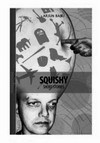
Squishy
Arjun Basu
DC Books
$18.95
paper
148pp
978-1897190364
Such is the unifying premise for Squishy, the debut short story collection from Montrealer Arjun Basu. The book is a tightly packed volume of 13 tales about those situations when fate careens beyond our control.
“As I started plotting the stories, I realized I was writing about a certain moment in peoples’ lives,” Basu explains in a phone interview. “That moment was not the moment where we say we’re going to take charge of things, or ‘I’m gonna do this and it’s going to change my life.'” Instead, Basu writes about moments of weakness, when his characters succumb to temptation or don’t quite pay enough attention to what’s unfolding around them. These “squishy” moments end up shaping his characters’ lives in ways they could never have anticipated. Says Basu, “If you go backwards in time to answer the ‘how did I get here’ question, which a lot of people ask every once in a while, sometimes you can’t pinpoint that moment because it was such an innocuous thing. It was a phone call you didn’t make or it was a business card that you kept, or it was crossing the street when you shouldn’t have or going into one store rather than another.
“While they range in setting from Dehradun, India to New York City, the stories in Squishy are united by a pervading tinge of fatalism. Characters strive to do their best given the limited information at their disposal, but are continually thwarted by circumstances beyond their control-namely, life. When asked if his worldview is essentially tragic, Basu pauses before quipping, “I don’t know if I have a tragic view of life as much as I have a realistic view of life, but maybe that in itself is tragic.
“Readers immediately sense misfortune lying in wait as each story gets underway. Following these narratives, one gets the feeling of watching a slasher film, when the protagonist unwittingly blunders into the dark room where the machete-wielding sociopath lurks. Yet Basu’s stories are written with a craft and imagination that make them far from predictable. He makes effective use of dramatic irony, allowing his readers to sympathize with his characters and grin knowingly at their misfortune. “I consider myself [to be] generally a happy person; I quite like my life. At the same time I think there’s great drama in unhappiness, and great comedy in other peoples’ tragedy,” says Basu.
Writing the stories in Squishy was something of a departure for the author, who has worked for six years as the editor-in-chief of enRoute, Air Canada’s in-flight magazine. At his day job, Basu aims to craft stories that are linear and direct, avoiding uncontrolled outcomes and loose ends. “In my professional life, I hate squishiness,” he explains. “That’s the irony, because as an editor you craft something with a writer that goes from point A to point B.” In fact, writing Squishy wasn’t exactly his idea in the first place. After being approached by David McGimpsey, a friend, poet, and editor at DC Books, Basu decided a fictional project was a good opportunity to change roles and work in a more artistic capacity. The transition proved to be a natural one, and Basu was able to create Squishy in between meetings, on weekends, and during the odd stolen moment. His abiding editorial respect for deadlines proved to be an asset in getting the stories done on time. Perhaps as a consequence of his work creating up-to-date and relevant content for enRoute readers, Squishy is adorned with details that place the stories firmly in the here and now. “I wasn’t trying to be overly contemporary, I was just trying to be myself,” says Basu. “The stories were all things I wanted to explore and they didn’t seem to have a time to them.” Stories like “Thursday” read like a series of observations from yesterday’s commute to work. The flicker of subway lights conjures spectres of al Qaeda, while passengers work on Sudoku puzzles to pass the time. In “The Idols,” a group of affluent twentysomethings speak in the fractured idioms of those more accustomed to text messages than conversation.
Throughout Squishy Basu reflects on timeless human dilemmas, interweaving details that reveal the strangeness inherent in our modern lives. This is where Squishy shines not only as entertainment, but also as an illuminating literary work. In revealing human pretensions and the mechanisms of chance that govern our fates, Basu reminds us to treat each other with more compassion, and to take ourselves a little less seriously. Citing American author and radio personality Studs Terkel’s thoughts on the subject, Basu believes that “people are hungry for stories-they’re part of our very being. I still think fiction helps us beat the hunger.”
With his first published work of fiction now available, Basu plans to focus on his editorial projects, while taking notes and amassing material for his next round of fiction. He also hopes to one day release a novel that’s long been sitting almost completed in his desk-assuming, of course, that he can find the necessary time, and that life co-operates. As is explained in Squishy‘s bio note, Basu’s life “is as squishy as anyone else’s.” For example, after arriving early at a party, Basu met the woman who would later become his wife, in the kitchen where she was struggling to cook some beans. That chance encounter led not only to marriage, but in a rather squishy way to Basu’s editorial career. “I got my job by reading the classifieds. I never do that, but the page in the paper was left open (by my wife) and there it was on the table in the kitchen and I saw the ad. Who knew?” mRb






0 Comments